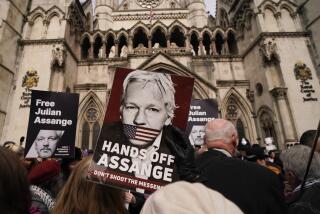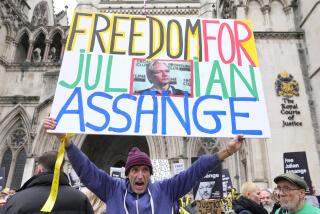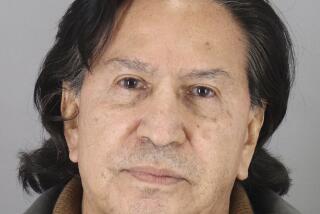Pinochet May Be Extradited to Spain to Stand Trial, British Judge Rules
- Share via
LONDON — Former Chilean dictator Augusto Pinochet may be extradited to Spain to face trial on 34 charges of torture and one of conspiracy to torture during his military regime, a British magistrate ruled Friday.
The decision was another victory for international human rights advocates and the latest setback in Pinochet’s yearlong battle to avoid prosecution for crimes committed against leftist political opponents during his 17-year rule.
But Pinochet’s supporters said they would keep fighting extradition with appeals that could last a year or more, and the 83-year-old general issued a defiant statement declaring his innocence.
“As the former president of the republic of Chile and senator, I declare that I am not guilty of the crimes of which I am accused,” said the statement read to the court by Pinochet’s lawyer, Clive Nicholls.
“Spain has not produced a single piece of evidence which shows that I am guilty. Not only that, Spain has not properly investigated any of these crimes and Spain does not even have jurisdiction to try me,” the statement said.
From the beginning, the Pinochet case has pitted two radically polarized views of international law against each other. One is Pinochet’s position that any crimes alleged to have been committed in Chile by his regime should be tried by the sovereign country. “The events in Chile have nothing whatsoever to do with Spain,” the general said.
The other is the view of the Spanish judge pursuing the case and of human rights lawyers that torture, genocide and other crimes against humanity are so grave that the perpetrators may be tried anywhere in the world.
“That’s what this case is all about--that states are acting as agents of the international community in enforcing international laws,” said Christopher Keith Hall, legal advisor to the human rights group Amnesty International.
Chilean author Ariel Dorfman, who attended the proceedings, added, “I think future dictators are going to be very worried with this decision. This is one more step in international jurisprudence, and [Yugoslav leader and war crimes suspect Slobodan] Milosevic, you should tremble.”
Pinochet was arrested in London last October on a warrant issued by Spanish judge Baltasar Garzon, who accused him of orchestrating the torture and murder of thousands of Chilean and Spanish citizens in a campaign of terror after his 1973 coup against democratically elected Socialist President Salvador Allende.
The ex-dictator has fought extradition every step of the way. First, Pinochet’s lawyers argued that he was immune from prosecution as a former head of state. Britain’s highest court in the House of Lords rejected that, but in its March 24 ruling, it also drastically limited his liability, saying he could be tried only for crimes carried out after 1988, when Britain signed the International Convention Against Torture.
That left just two charges--one count of conspiracy to torture and one of torture--from the original extradition request.
Garzon subsequently added 33 more charges of post-1988 torture, which Pinochet’s lawyers argued should not be included in the extradition hearing.
But the magistrate, Ronald Bartle, said he could find no basis for excluding the new charges from the hearing or from perusal by Home Secretary Jack Straw, who ultimately will decide whether to send Pinochet to Spain.
Bartle, who had been portrayed by left-of-center newspapers as a right-wing “Thatcherite” with a pro-Pinochet bias, began his presentation by saying his decision was “based upon the law and the law alone.”
He said that, whatever he might believe about the Pinochet case, the general’s guilt or innocence was irrelevant to the hearing and a matter to be decided by a Spanish court. His job, he said, was to determine whether the extradition request was legal--and it was, he said.
Pinochet’s attorneys may appeal to the High Court and the House of Lords before the case lands on Straw’s desk. Pinochet’s lawyers have hinted that, if those appeals fail, they will seek his release on humanitarian grounds.
Pinochet was not in court for Bartle’s ruling, having been excused because of ill health. The general, who wears a pacemaker, has suffered two minor strokes in recent weeks, said retired Gen. Luis Cortes Villa of the Pinochet Foundation, an organization that promotes the ex-dictator’s legacy. Pinochet also suffers from diabetes, urological ailments, fatigue and depression, and his weakness is compounded by medications he is taking, Cortes said in a recent interview with The Times.
“He is in danger of dying at any moment,” Cortes said, adding that “I don’t think my general can survive another English winter.”
In addition to appeals and a request for release on humanitarian grounds, a new potential strategy has emerged. Experts say Chile should request Pinochet’s extradition to stand trial at home on a 40-count case being prepared against him by a Chilean judge investigating crimes by his regime.
Under Spanish and European law, a Chilean extradition request would take precedence over the pending Spanish indictment, said Ricardo Israel, a political analyst in Santiago, Chile’s capital. Pinochet would then theoretically have to stand trial, though his parliamentary immunity is an obstacle.
“The best justice [for Pinochet] can only be achieved in Chile,” the Chilean government said Friday in a two-page statement that repeated previous complaints that Pinochet’s detention violates Chilean sovereignty.
If Pinochet returns, “he will have to confront judicial processes against him like any other citizen in a similar situation,” the statement said. “We must be capable of solving our own problems and cannot let others resolve them in our name.”
In what has become a periodic ritual, while most Chileans went calmly about their business Friday, small groups of those most directly affected by the Pinochet case--the ex-dictator’s allies and enemies--gathered at dawn to await the news from London.
Pinochet partisans reacted with gloom. The British judge’s decision reaffirmed their fear that, whether or not he ever goes to trial in Spain, Pinochet will never return to Chile.
Several hundred anti-Pinochet activists celebrated Friday’s decision with a peaceful march through downtown Santiago. They included organizations of former political prisoners, relatives of the disappeared and members of leftist political parties.
The marchers carried signs saying “No to Amnesty” and “Bloodshed cannot be negotiated”--clear allusions to a human rights round table recently initiated by the Defense Ministry. Although prominent human rights lawyers are participating in the round table, other Pinochet adversaries say the discussions are a public relations effort by the government to press for Pinochet’s release.
The marchers also waved British and Spanish flags to express their thanks to those nations.
In London, Bartle’s decision drew cheers from Chilean exiles carrying signs that said, “Don’t let this butcher go.”
Pinochet ally Fernando Barros vowed to “fight the battle the whole way,” but Human Rights Watch director Reed Brody said he was confident that Bartle’s decision would be upheld by higher courts.
“Pinochet can drag this out with appeals but he cannot hope to overturn this sound legal decision. Unless politics intervenes, Pinochet will be going to Spain,” Brody said.
*
Times staff writer Sebastian Rotella in Buenos Aires contributed to this report.
More to Read
Sign up for Essential California
The most important California stories and recommendations in your inbox every morning.
You may occasionally receive promotional content from the Los Angeles Times.













